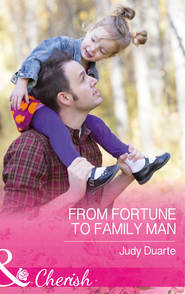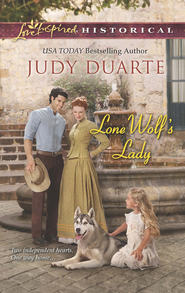По всем вопросам обращайтесь на: info@litportal.ru
(©) 2003-2024.
✖
His Mother's Wedding
Автор
Год написания книги
2018
Настройки чтения
Размер шрифта
Высота строк
Поля
Oh, for goodness sake, how could his touch have that kind of effect on her when he was definitely Mr. Wrong?
As he escorted her out the door and to his car, she couldn’t help commenting about an article she’d recently read in a women’s magazine. “They say you tell a lot about people by the cars they drive.”
He glanced at her Toyota. “That’s what I’m afraid of.”
In spite of the warmth from his touch, her backbone stiffened. “What’s that supposed to mean? I can afford a better car, but I’ve been saving my money to pay for a private investigator.”
“I wasn’t sizing up your bank account, just your driving skill.” He nodded toward the rear of her car, where the trunk had been dented.
“I bought that car used, and it came that way. I could have paid for some bodywork but chose to save the money and use it to cover the cost of finding my sister.”
“And what about that little red rosebud tied onto the antenna with the ribbon?”
She crossed her arms and stopped dead in her tracks. “What’s wrong with that?”
“Do you forget where you’re parked?”
Once in a while, when she had her mind on other things. But she’d be darned if she’d admit it.
The best defense was a good offense, she’d always been told. “You don’t think that I’ve got you figured out, too? What kind of man drives a vintage sports car?”
“One who likes to eat in diners, drink cherry Cokes and listen to oldies on a jukebox.”
“Or perhaps one who wants to appear more manly, more powerful? More potent?”
“Yeah, right.” He surprised her by opening the passenger door. “Get in.” His voice held a rugged, demanding edge, yet his hand gently slid from her back.
The man was a contradiction if she’d ever met one.
As she stooped to climb into the passenger seat, she flashed more of her leg than she’d intended. She glanced up, not at all surprised to see him watching, appreciation glimmering in his eye.
“By the way,” she said, “I just figured out another reason you have this car. You like to watch women get in and out of it.”
He shot her a crooked grin. “Yep. You’ve got me pegged, all right.”
Something told her that she didn’t. Not completely. But there was no doubt about some things. Rico Garcia was a ladies’ man. And after his initial gruffness, a real charmer.
If a woman wasn’t careful, she could be easily swept off her feet.
Rico closed her door, then walked around the car and slid behind the wheel. As the engine roared to life, Molly decided to hang on to her hat.
And to her better judgment.
Chapter Three
At a quarter to six Rico and Molly arrived at Antonio’s, a waterfront restaurant that offered diners the charm of old-world Italy and a gorgeous view of Lake Lassiter as it sat amidst the rolling lawns of the city park.
When Rico told the hostess they were with the Osterhout party, the young woman led them past a rustic stone fireplace and into a dining room with textured white plaster walls separated by dark wood beams. She escorted them to a linen-draped table near the large bay window that would allow them to watch the sun slide into the pristine water.
Rico held Molly’s chair as she took a seat, then sat across from her.
It was one of the most romantic settings she had ever seen, and for a moment it seemed as though she was on a date with the handsome private investigator—as silly as that was. She’d never date a man like Rico, but that didn’t mean she was immune to his heart-strumming smile or his musky, mountain-crisp scent.
She was, however, determined to ignore the effect he had on her.
Rico asked the hostess if she’d send over some bread.
“Of course, sir.”
When the woman walked away, Rico cast Molly a Casanova smile. “Did I mention being hungry?”
“A couple of times.” She couldn’t help but grin.
“The dentist will have to forgive me for being rude and not waiting. But I’ve got to eat something.”
“I’m sure he and your mom will understand.”
She’d meant to bring up the subject of her sister while they rode in his car, but the timing hadn’t seemed right. So they had talked about his Corvette, about the mint condition of the interior, the speed it reached on an open road. The car suited him, she supposed.
Moments later, when one of the busboys brought water and set a basket on the table, Rico offered Molly the first choice of several small precut loaves of fresh-baked bread—French, sourdough, pumpernickel….
She took a slice of the baguette, and he chose the sourdough.
“So,” he said, taking his knife and smearing a thick slab of butter on his bread, “tell me about the sister you want to locate.”
Molly wasn’t sure where to begin. There were some things she never revealed to the men she ate dinner with. In fact, there were some memories she’d never even shared with her friends.
But this was different. Rico was a private investigator, and she’d tell him anything she could remember that might help him locate Lori.
“I was born in Los Angeles,” she began, “the oldest of two girls. My dad was an on-again, off-again junkie, and I don’t remember much about my mother other than she left one night to buy a pack of cigarettes and never came back.”
Rico listened intently, his demeanor taking on a professional air, which made it easier for her to share the things she kept close to the vest.
“My father was pretty worthless,” she admitted, “so I took over as a surrogate mother to my younger sister, Lori.”
Rico took a sip of water and watched her over the rim of his glass. He didn’t speak, didn’t prod her to keep going, but an intensity in his eyes told her he was listening carefully.
“My dad wasn’t big on wasting what little money he brought home on groceries, so I’d have to be a little creative.” She shrugged. “You know, soda crackers and beer nuts for breakfast, stale-bread-and-ketchup sandwiches for lunch. That sort of thing.”
Again she tried to read something in his eyes—sympathy, disgust. Something that might suggest she ought to keep quiet and hold on to the rest of the ugliness. But he merely listened, hiding his opinion as a professional should.
Earlier he’d told her that he’d seen the seedy side of life. She supposed he was realizing that she’d seen a bit of it herself.
She picked up her fork and ran a finger across the edge of the tines, then replaced it beside her plate. For a moment she struggled with making eye contact, then shrugged it off and caught his gaze. “One day when I was eleven, we were left alone for several days, and I had to scavenge around for food….”
His dark brow twitched—the only sign of a response she’d seen so far.
“Not in Dumpsters,” she told him, in case his thoughts had gone in that direction. “But there was a little taco shop down the street—Rosarita’s. And sometimes the manager would give me some leftover menudo or a couple of bean burritos. There was also a newsstand that sold coffee and sweet rolls to its customers. The guy who worked on weekends, Harold, would give me day-old donuts for free.”











